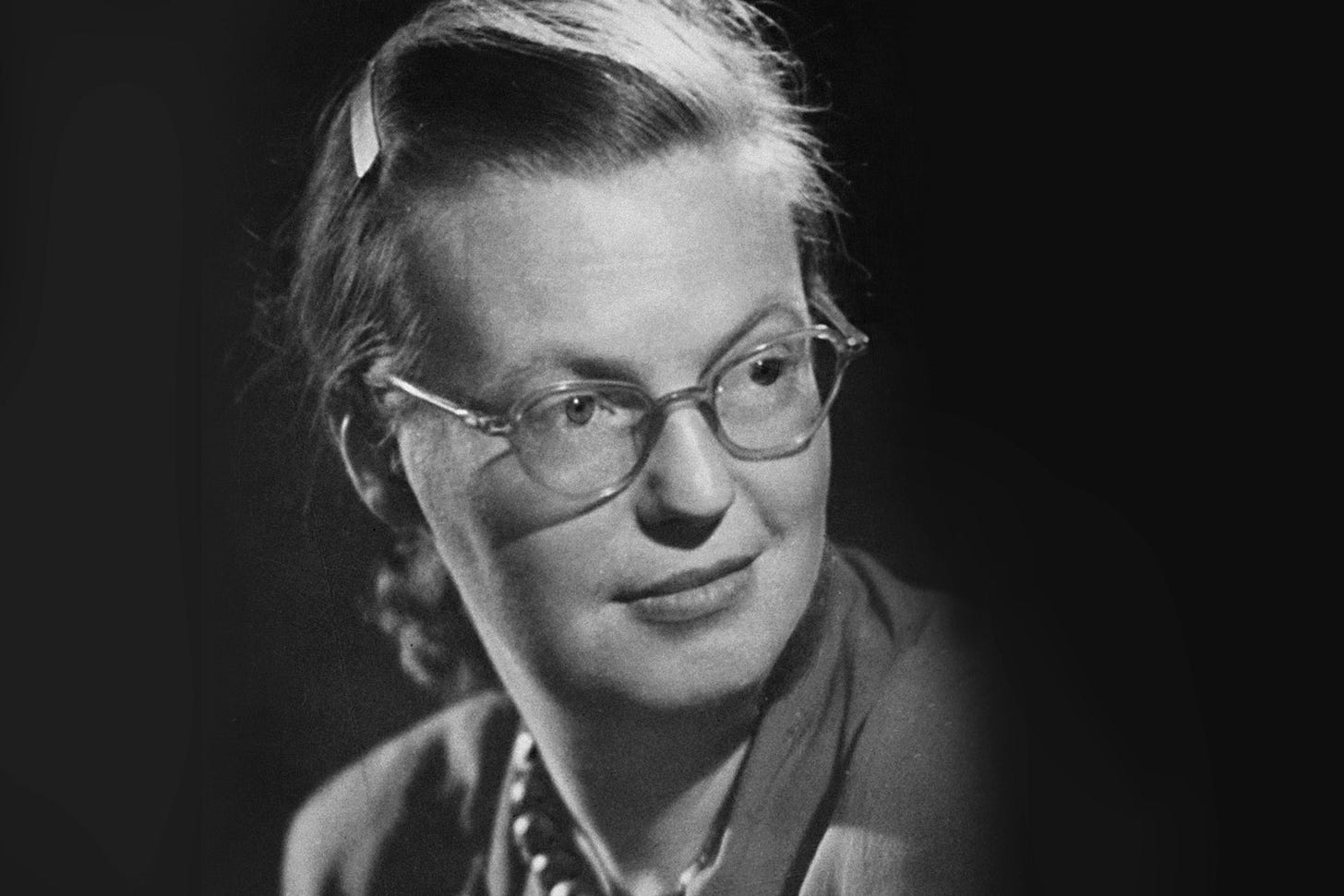Shirley Jackson's "The Haunting of Hill House": A Psychological Thriller Like No Other
Plus our October reading schedule
Note: This email is going out to all Big Readers—free and paid alike. To upgrade to a paid subscription, simply click any of the buttons below.
Hello, readers, and happy Scaretober to those who celebrate!
This month, The Big Read is diving into Shirley Jackson’s inimitable legacy with a group read of The Haunting of Hill House.
It’s a short novel—checking in at under 200 pages in most editions—which makes its psychological thrills all the more potent.
I’ll send the final recap/discussion on Halloween, which puts our “official” starting date on October 13th. Here’s the schedule:
October 13th: Introduction and Context
October 20th: Recap/discussion for Chapters 1-3
October 27th: Recap/discussion for Chapters 4-6
October 31st: Recap/discussion for Chapters 7-9
November 3rd: Group video chat
Can’t (or don’t want to) join for this month? No problem. In Nov/Dec, we’re reading Dickens’ Great Expectations, just as a heads up.
The benefits of a paid subscription
When you subscribe for $5/month (or $50/year), you’ll get the following:
Weekly recaps with background, contextual material, and highlights from that week’s chapters.
Access to our robust weekly discussions, where you’ll get invaluable insights from a diverse community of readers.
A group video call at the end to discuss the book.
The motivation and accountability to read an all-time classic.
Shirley Jackson’s brilliance as a writer
As a genre, horror/mystery doesn’t tend to get taken very seriously. So for a female horror author working in mid-century America to find herself regularly listed among the country’s most influential writers—ever—means something quite special.
What is about Jackson’s writing that has deeply affected her readers for nearly eight decades?
It starts rather simply with the idea that Shirley Jackson’s brand of horror is of a psychological nature rather than the more visceral type of fear you likely associate with this genre.
Biographer Ruth Franklin writes:
“No writer since Henry James has been so successful in exploring the psychological reach of terror, locating in what we fear the key to unlock the darkest corners of the psyche. ‘I have always loved . . . to use fear, to take it and comprehend it and make it work,’ Jackson once wrote in a line that could be her manifesto. In our fears and in our crimes, she believed, we discover our truest selves. And the outrage that greeted ‘The Lottery’ shows that she was right.”
With her best stories and novels, Jackson starts by painting a calm picture of normality. Here’s the opener for “The Lottery”:
“The morning of June 27th was clear and sunny, with the fresh warmth of a full-summer day; the flowers were blossoming profusely and the grass was richly green. The people of the village began to gather in the square, between the post office and the bank, around ten o’clock; in some towns there were so many people that the lottery took two days and had to be started on June 26th, but in this village, where there were only about three hundred people, the whole lottery took only about two hours, so it could begin at ten o’clock in the morning and still be through in time to allow the villagers to get home for noon dinner.”
Such an idyllic, placid intro!
Even a more disturbing introduction, like that of Jackson’s novel We Have Always Lived in the Castle, has a strange calmness to it:
“My name is Mary Katherine Blackwood. I am eighteen years old, and I live with my sister Constance. I have often thought that with any luck at all I could have been born a werewolf, because the two middle fingers on both my hands are the same length, but I have had to be content with what I had. I dislike washing myself, and dogs, and noise. I like my sister Constance, and Richard Plantagenet, and Amanita phalloides, the death-cup mushroom. Everyone else in my family is dead.”
It’s unsettling, for sure, but also rather even-tempered.
Besides its psychological nature, Jackson’s writing leans heavily on domesticity as a theme. Her stories are focused on families, households, and relationships. And the kicker: women are always at the center. Ruth Franklin notes:
“Jackson’s brand of literary suspense is part of a vibrant and distinguished tradition that can be traced back to the American Gothic work of Nathaniel Hawthorne, Edgar Allan Poe, and Henry James. Her unique contribution to this genre is her primary focus on women’s lives.”
In the sometimes hyper-masculine 1940s and 1950s, Shirley Jackson illuminated women's domestic fears—especially the fear that their homes and families would drive them crazy.
Join us this month as we explore Shirley Jackson’s best-known novel, The Haunting of Hill House.




I’m looking forward to reading this with the group. 🙂
I need to read this. I finally read We Have Always Lived in a Castle a few months ago and was blown away by the uncanny, weird, psychologically astute story.